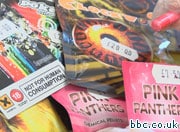More than 300 shops have stopped selling so-called legal highs after the Government’s recent ban, according to new figures from the Home Office.
A further 24 shops have been completely shut down by authorities and close to 200 arrests made.
The ban became effective across the UK in May.
Psychoactive effect
Also called New Psychoactive Substances (NPS), the drugs mimic the effects of substances such as cannabis, cocaine and ecstasy.
Under the Psychoactive Substances Act, any substance “capable of producing a psychoactive effect in a person who consumes it” was outlawed, with a few exceptions, such as alcohol and caffeine.
Prior to the legislation coming into force, legal highs had to be banned on a case by case basis.
Prison
Under the new legislation, dealers could face up to seven years in prison with those found in possession of the substances facing up to two years.
The Angelus Foundation, which seeks to help people understand the dangers of the drugs, believed many online traders had also shut down since the ban.
Jeremy Sare, Director of Communications for the group, said: “I think the ban has made a big difference and we are supportive of the legislation.”
He added: “Traders seem to have stopped selling. It is still early days and we may look back in 12 months and see more online trading but many look to have closed.”
Closure
When it launched the new Bill, the Government said there were 120 deaths involving NPS in England, Scotland and Wales in 2013.
The Home Office believe the ban is sending out a strong message to dealers and are confident that the new legislation is proving to be effective.
Safeguarding minister Sarah Newton said: “I am delighted to see so many retailers denied the chance to profit from this reckless trade.
Clear message
“The Psychoactive Substances Act is sending out a clear message – this Government will take whatever action is necessary to keep our families and communities safe.
“These drugs are not legal, they are not safe and we will not allow them to be sold in this country.”

